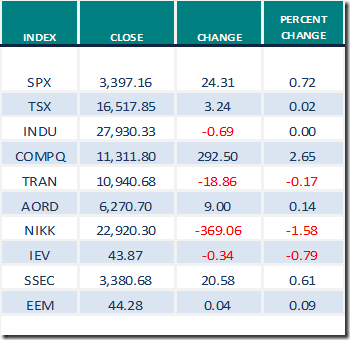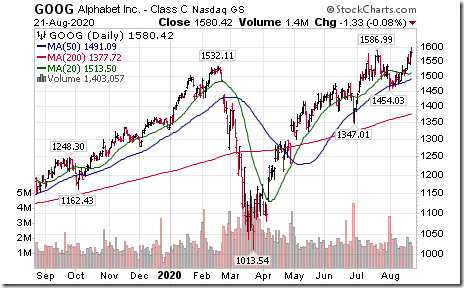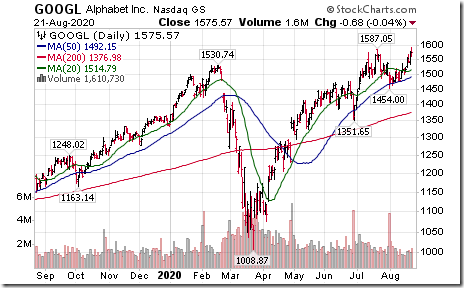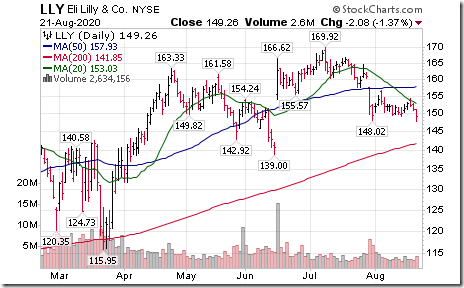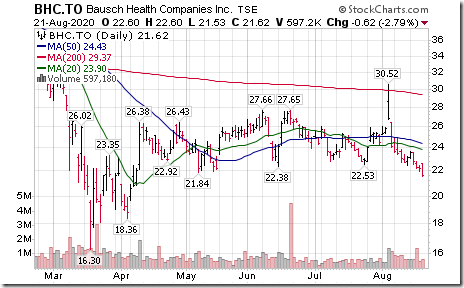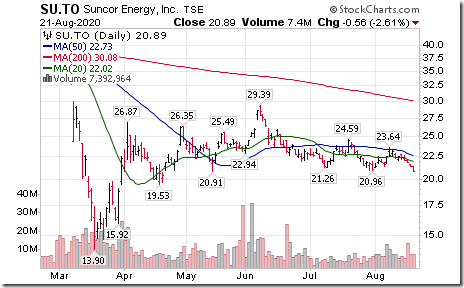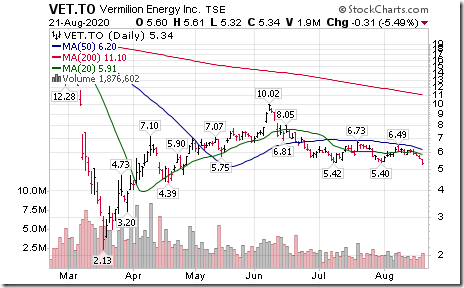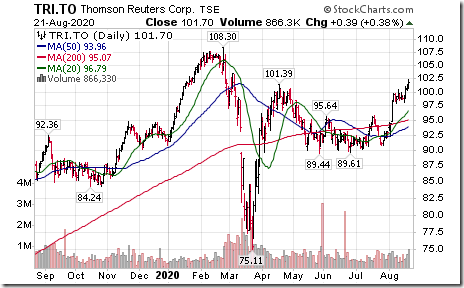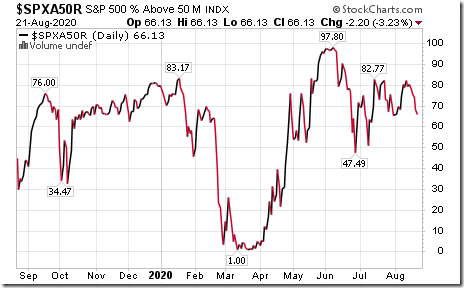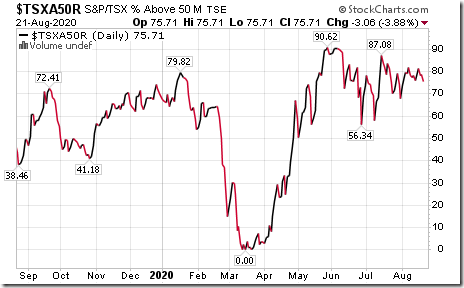by Don Vialoux, EquityClock.com
The Bottom Line
Most equity indices around the world were mixed last week. Major influences remain concern about a second wave of the coronavirus (negative) and possibility of approval of a vaccine (positive). Momentum indicators for North American equity markets remained intermediate overbought and past their peak. The VIX Index remained elevated: It typically moves higher between now and early October. Seasonal influences for most equity markets around the world tend to be slightly negative between now and early October (particularly during U.S. Presidential election years). Look for volatile, choppy equity markets between now and at least mid-October.
Observations
The VIX Index (better known as the Fear Index) remained elevated last week. Intermediate trend is flat/down and showing signs of bottoming. Watch for moves above 20, 50 and 200 day moving averages to signal a change in intermediate trend.
The Dow Jones Industrial Average during U.S. Presidential Election years has a history of moving higher to the end of August (when the Democrat and Republican conventions reach a conclusion), moving lower to the end of October and moving higher after the election.
Medium term technical indicator for U.S. equity markets (e.g. Percent of S&P 500 stocks trading above their 50 day moving average) moved lower last week. It remains intermediate overbought and rolling over. See Barometer chart at the end of this report.
Medium term technical indicator for Canadian equity markets slightly moved lower last week. It remains overbought and shows early signs of rolling over. See Barometer chart at the end of this report.
More short term short term momentum indicators for U.S. markets/commodities/sectors (20 day moving averages, short term momentum indicators) moved lower last week (particularly commodities).
More short term momentum indicators for Canadian markets/sectors also moved lower last week.
Updated consensus for S&P 500 company revenues and earnings from www.FactSet.com are unavailable this week. It returns next week.
Economic News This Week
U.S. July New Home Sales to be released at 10:00 AM EDT on Tuesday are expected to drop to 750,000 from 776,000 in June.
July Durable Goods Orders to be released at 8:30 AM EDT on Wednesday are expected to increase 3.3% versus a gain of 7.6% in June. Excluding Transportation Orders, July Durable Goods Orders are expected to increase 2.0% versus a gain of 3.6% in June.
Annualize second estimate of U.S. second quarter GDP to be released at 8:30 AM EDT on Thursday is expected to drop 32.9% versus a drop of 5.0% in the first quarter.
July Personal Income to be released at 8:30 AM EDT on Thursday is expected to ease 0.2% versus a decline of 1.1% in June. July Personal Spending is expected to increase 1.5% versus an increase of 5.6% in June.
Weekly Initial Jobless Claims to be released at 8:30 AM EDT on Thursday is expected to slip to 925,000 versus a drop of 1,106,000 last week.
June Canadian GDP to be released at 8:30 AM EDT on Friday is expected to increase 3.5% versus a gain of 4.5% in May.
August Michigan Consumer Sentiment is expected to increase to 72.8 from 72.5 in July.
Earnings News This Week
Focus is on the Canadian Banks
Trader’s Corner
Equity Indices and related ETFs
Daily Seasonal/Technical Equity Trends for August 21st 2020
Green: Increase from previous day
Red: Decrease from previous day
Commodities
Seasonal/Technical Commodities Trends for August 21st 2020
Green: Increase from previous day
Red: Decrease from previous day
Sectors
Daily Seasonal/Technical Sector Trends for August 21st 2020
Green: Increase from previous day
Red: Decrease from previous day
Technical Scores
Calculated as follows:
Intermediate Uptrend based on at least 20 trading days: Score 2
(Higher highs and higher lows)
Intermediate Neutral trend: Score 0
(Not up or down)
Intermediate Downtrend: Score -2
(Lower highs and lower lows)
Outperformance relative to the S&P 500 Index: Score: 2
Neutral Performance relative to the S&P 500 Index: 0
Underperformance relative to the S&P 500 Index: Score –2
Above 20 day moving average: Score 1
At 20 day moving average: Score: 0
Below 20 day moving average: –1
Up trending momentum indicators (Daily Stochastics, RSI and MACD): 1
Mixed momentum indicators: 0
Down trending momentum indicators: –1
Technical scores range from -6 to +6. Technical buy signals based on the above guidelines start when a security advances to at least 0.0, but preferably 2.0 or higher. Technical sell/short signals start when a security descends to 0, but preferably -2.0 or lower.
Long positions require maintaining a technical score of -2.0 or higher. Conversely, a short position requires maintaining a technical score of +2.0 or lower
Changes Last Week
Technical Notes for August 24th
Alphabet (GOOG and GOOGL), a NASDAQ 100 stock moved above $1,587.05 to an all-time high extending an intermediate uptrend.
Eli Lilly (LLY), an S&P 100 stock moved below $148.02 setting an intermediate downtrend.
Bausch Health (BHC), a TSX 60 stock moved below $21.84 setting an intermediate downtrend.
Canadian oil producer stocks are under technical pressure. Suncor (SU), a TSX 60 stock moved below $20.96 setting an intermediate downtrend. Vermillion Energy moved below $5.40 setting an intermediate downtrend.
Thomson Reuters (TRI), a TSX 60 stock moved above $101.39 extending an intermediate uptrend.
S&P 500 Momentum Barometer
The Barometer dropped 2.20 on Friday and 14.03 last week to 66.13. It remains intermediate overbought and has rolled over.
TSX Momentum Barometer
The Barometer dropped 3.06 on Friday and 0.48 last week to 75.71. It remains intermediate overbought and has rolled over.
Disclaimer: Seasonality and technical ratings offered in this report and at
www.equityclock.com are for information only. They should not be considered as advice to purchase or to sell mentioned securities. Data offered in this report is believed to be accurate, but is not guaranteed
This post was originally publised at Vialoux's Tech Talk.






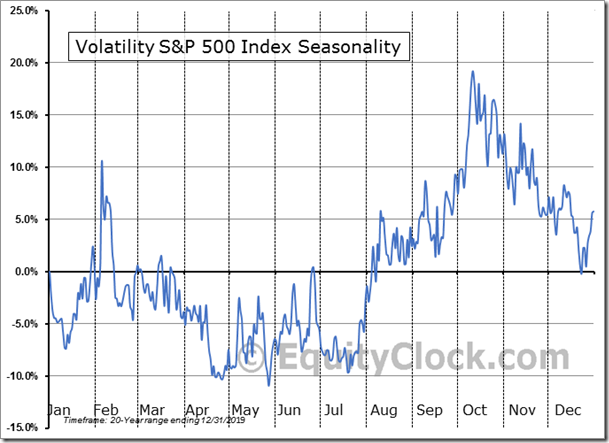
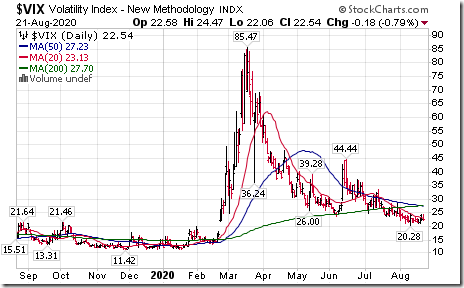
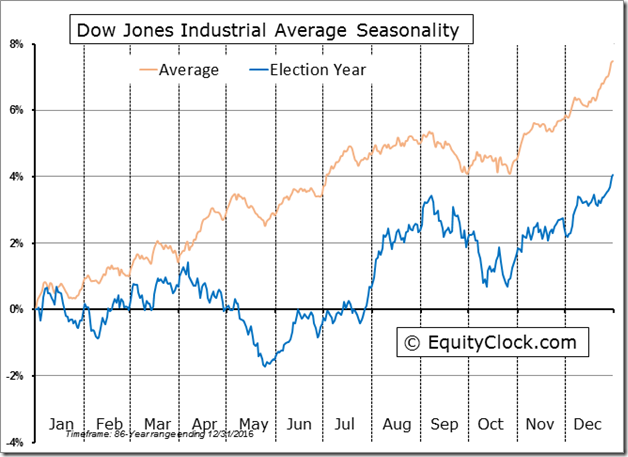
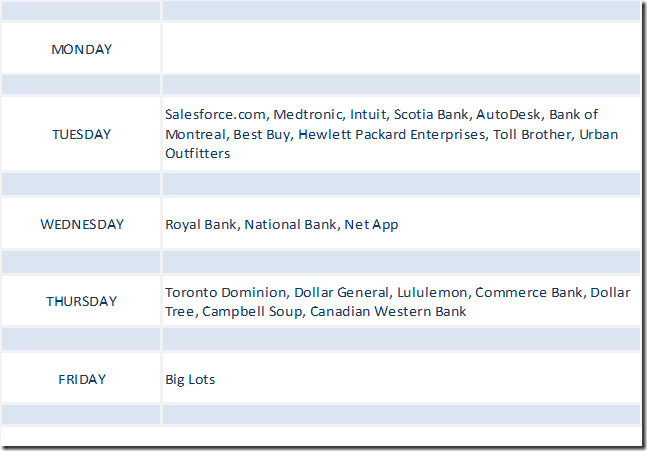
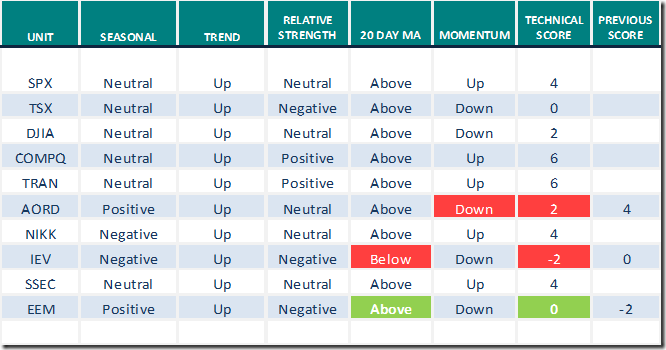
![clip_image002[3] clip_image002[3]](https://advisoranalyst.com/wp-content/uploads/2020/08/clip_image0023_thumb-5.png)
![clip_image002[1] clip_image002[1]](https://advisoranalyst.com/wp-content/uploads/2020/08/clip_image0021_thumb-7.png)
